1st Newsletter | October 2024
Welcome to AZA4ICE!
Our Journey towards Sustainable Aquaculture Begins
What is AZA4ICE about?
Aquaculture plays a crucial role in the economic growth o the Euro-Mediterranean region. However, it faces significant challenges due to traditional linear economy practices that deplete resources and the lack of coordination among stakeholders.
Recognizing the need for sustainable solutions, AZA4ICE was established to develop innovative ecosystem aquaculture spatial planning approaches and guidelines for public and private stakeholders, filling the lack of dialogue and blunting conflicts of different uses in close-to-coast and inland waters. We engage stakeholders across various sectors to collaboratively drive the transition to a circular economy in aquaculture, ensuring environmental conservation and economic growth.
AZA4ICE Partnership
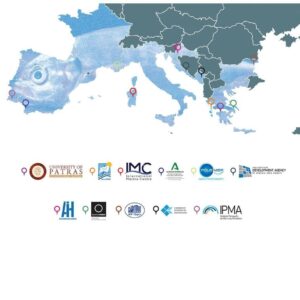
AZA4ICE Key Numbers
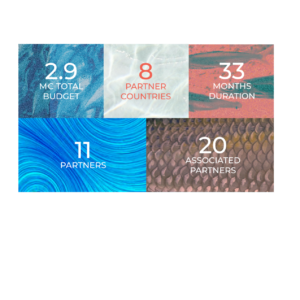
AZA4ICE NEWS
We have successfully held two project meetings:
- Kick-off Meeting of AZA4ICE Project held in Patras, Greece on February 22-23, 2024, where project partners gathered to set the stage for a transformative journey in circular aquaculture
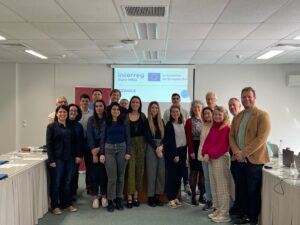
- Second Project Meeting and Steering Committee of the Project hosted in Cadiz, Spain on June 4-6 2024, where we discussed progress shared insights, and planed the next steps to achieving our mission.
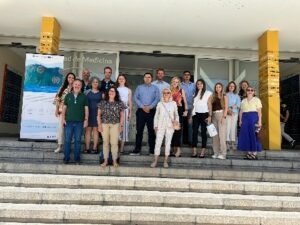
Additionally, AZA4ICE Project has also participated in several key events:
- European Maritime Day 2024 in Svendborg, Denmark, on May 30 & 31, 2024
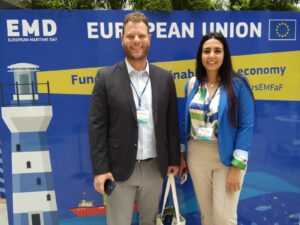
- 2nd Innovative Sustainable Economy Mission Innovation Camp organized by the Governance Project of Innovative Sustainable Economy Mission on May 29 & 29, 2024
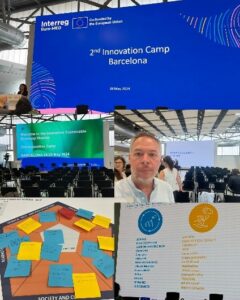
These events provided valuable opportunities to spread awareness about our goals and engage with stakeholders across Europe.
AZA4ICE Highlights
AZA4ICE Methodology Development
One of the key milestones achieved by the AZA4ICE project is the completion of the AZA4ICE Methodology. This comprehensive framework will guide the project’s ecosystem aquaculture spatial planning and circular aquaculture practices, promoting sustainable and inclusive aquaculture across the Euro-Mediterranean region.
Launch of Pilot Actions
The pilot actions have officially begun at various pilot sites, marking a significant step forward for AZA4ICE. Each site will showcase the methodology in action, testing innovative approaches to circular aquaculture. Here are a few highlights from our pilot locations:
- Étang de Thau, France: Located in the Occitanie region, Étang de Thau is the largest lagoon in Southern France, known for its rich biodiversity and economic activity. This pilot, led by PMM-TVT, focuses on the production of shellfish, algae, and echinoderms, all integrated under the framework of Integrated Multi-Trophic Aquaculture (IMTA). Local stakeholders, including transfer centers, shellfish producers, and scientists, have already been engaged to collaborate on this initiative.
- Varna Bay, Bulgaria: In Varna Large Bay Area, our partner IFR has initiated the data collection on the physical and chemical properties of the Black Sea’s Varna Bay. Biological data is also being analyzed and a GIS database is being created to map aquaculture operations and other economic activities in the area. The mapping of aquaculture sites along the Bay is already complete.
- Cabras Lagoon, Sardinia, Italy: In partnership with the fish farmers of “Pescatori del Tirso,” our partner IMC is testing a circular aquaculture system. The project focuses on farming species like sea bream, sea bass, grey mullet, and Pacific oysters, following the principles of Integrated Multi-Trophic Aquaculture and AZA4ICE methodology.
- Estuary of River Krka, Šibenik, Croatia: In collaboration with local fish and shellfish farmers, PI DA SKC is exploring the potential for introducing Integrated Multi-Trophic Aquaculture (IMTA) and the AZA4ICE methodology into existing aquaculture practices. The pilot activities aim to enhance the utilization of this aquaculture-designated area while protecting the sensitive and unique estuarine environment.
- Šasko Lake, Montenegro: In the Municipality of Ulcinj, PKCG will explore the potential of establishing an Allocated Zone for Integrated Multi-Trophic Aquaculture (IMTA) in this underutilized area. Known for its rich flora, fauna, and cultural heritage, the pilot will also focus on raising awareness among local businesses, citizens, and tourists about the importance of eco-friendly production, consumption, and service provision.
- Ria Formosa Lagoon, Portugal: The Ria Formosa lagoon is part of the NATURA 2000 network and is an important site for shellfish production and earth pond aquaculture. IPMA will assessed the potential of sustainable production systems, such as Integrated Multi-Trophic Aquaculture (IMTA) and Recirculating Aquaculture Systems (RAS) using the AZA4ICE methodology.
- Bay of Cádiz, Spain: In the Bay of Cádiz, IFAPA is conducting a comprehensive study across six different locations, monitoring body masses in various production systems. These include wastewater from recirculating aquaculture systems, intensive flow-through systems, extensive ponds, natural marshes, and broodstock indoor facilities. The goal is to advance models toward Integrated Multi-Trophic Aquaculture (IMTA) and Integrated Multi-Trophic and Recirculation Aquaculture Systems (IMRAS).
Sampling Initiatives in Andalusia
Our partner IFAPA has initiated the sampling process in Andalusia to monitor water quality and assess nutrient levels across various aquaculture systems. This effort is crucial for understanding the environmental impact and improving the sustainability of aquaculture practices in the region.
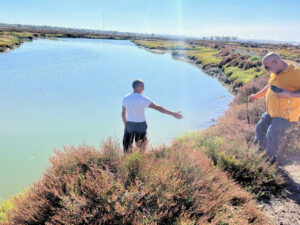
Planning Aquaculture for Sustainability in Sardinia.
On 11th July 2024, at the Advisory Group on Spatial Planning for Aquaculture at FAO-GFC in Sardinia, Italy, a discussion was held on how spatial planning tools, such as Aquaculture Designated Zones (AZAs), play a crucial role in minimizing conflicts with other uses like tourism, marine protected areas, and small-scale fishing. Erika Porporato, researcher from IMC, emphasized that proper planning ensures sustainable aquaculture development. By strategically identifying aquaculture zones, countries can align seafood production with environmental protection, fostering both ecological sustainability and socio-economic growth. This approach has already supported countries such as Albania, Georgia, and Tunisia in advancing their aquaculture sectors responsibly.
Website Launch
AZA4ICE website is now live! Visit us to discover more, subscribe to keep receiving our newsletters, and follow us on our social media channels!
Visit our website
How to Get Involved
Visit our website, follow us on social media, contribute to discussions, and share our updates within your networks. Together, we can make a significant impact on sustainable aquaculture in the Mediterranean.
Stay Connected!
- Website: interreg-euro-med.eu
- Facebook: AZA4ICE Facebook Page
- LinkedIn: AZA4ICE LinkedIn Profile
- X (Twitter): AZA4ICE on X
- YouTube: AZA4ICE YouTube Channel
Thank you for being part of the AZA4ICE journey!
We look forward to sharing more exciting updates with you in our next issue.
GDPR Notice
We inform you that your contact details were originally collected during the BLUEfasma project and are now being used for the AZA4ICE project , in accordance with EU data protection regulations (GDPR). These details will continue to be used exclusively for project-related updates, newsletters, and relevant communications.
If you wish to continue receiving updates from the AZA4ICE project, no further action is required. However, if you prefer not to receive these communications, you can unsubscribe at any time by clicking [here].
If you have any questions regarding how your data is being used or would like further clarification, feel free to contact us at [ikorda@dynamicvision.gr].


